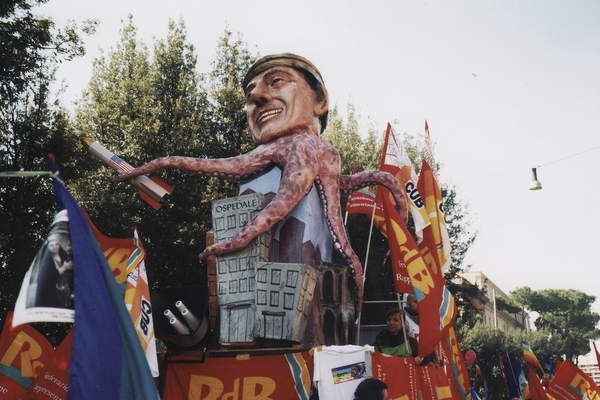An American Witness to the European Movement Against the Iraq Invasion

An effigy protests Italian Prime Minister Silvio Berlusconi's support for the invasion of Iraq, Rome, February 15, 2003
March 19 marked the 20th anniversary of the United States and Coalition Forces’ Invasion of Iraq in 2003. The George W. Bush administration’s preparations for war against Iraq had drawn widespread international criticism and triggered an international anti-war movement. The outbreak of the Iraq War disrupted the global political system and severely strained Transatlantic relationships between the United States and its allies and partners in the European Union.
As the Bush administration conducted an international diplomatic campaign to prepare for war against Saddam Hussein, Europeans questioned the need for war. I was conducting research in Florence, Italy, during the run-up to the outbreak of war and was deeply troubled by the Bush administration’s bellicose policies and its unrelenting drive for war. As a historian of violence based in Florence, I was able to observe the organization of a significant European anti-war movement.
The first European Social Forum, a European convention of social and activist organizations, was held in Florence in November 2002. I attended the convention and observed many of the sessions that discussed international politics and criticized the Bush administration’s foreign policy. Other panels promoted pacifism and explored techniques of anti-war activism. At the end of the European Social Forum, the member groups organized the first pan-European anti-war march. I participated along with an estimated 450,000 activists in a massive anti-war march through the streets of Florence opposing the Iraq War. Groups carried rainbow-colored pace (peace) flags and banners with anti-war slogans such as “Non Alla Guerra - No War” and “Not in My Name.”
The organizers of the anti-war march at the European Social Forum in Florence prepared an even larger international day of protest against the impending war in February 2003.
As these protests were being organized, European opposition to the planned war solidified. French and German diplomats openly opposed the planned war in Iraq. European media increasingly questioned the United States’ pursuit of war against Saddam Hussein.
Secretary of State Colin Powell appeared before the United Nations Security Council on February 5, 2003 to present the case that Iraq possessed (or had the means to manufacture) chemical weapons of mass destruction (WMD) and had ties to Al Qaeda. Powell’s presentation utterly failed to convince the United Nations diplomats or the world’s journalists of the existence of WMD in Iraq or of the necessity for a military campaign to “liberate” the Iraqi people.
Julian Borger argued that “Colin Powell will be most remembered for the act he most regretted, his 2003 presentation to the UN security council laying out US evidence of Iraqi weapons of mass destruction, which turned out not to exist.”
Sharp contrasts appeared between the U.S. news media’s jingoistic coverage of Powell’s presentation—it completely justified war—and the European and world news media’s criticisms of Powell—he was utterly unconvincing.
Many European citizens mobilized in opposition to the United States’ Iraq War. Phyllis Bennis recently observed that “Twenty years ago — on February 15, 2003 — the world said no to war. People rose up in almost 800 cities around the world in an unprecedented movement for peace.”
The anti-war protests on February 15 achieved a massive coordinated mobilization of citizens worldwide. “There were 600 marches in 54 countries: 250 alone in Canada and the United States, 105 in Europe, 37 in the Middle East and Asia, 16 in Latin America, 8 in Africa, 34 in Oceania, and 1 in Antarctica.” Millions of citizens marched against war in Rome, London, Paris, Madrid, Barcelona, Berlin, Stockholm, and other European cities, often evoking the initiative of the European Social Forum in Florence. Additional protests were held in New York, Beirut, Melbourne, Tokyo, and smaller cities around the world.
The United States’ military invasion of Iraq unleashed decades of destruction and suffering for the Iraqi people and destabilized the entire Middle East. The invasion also weakened the United States’ relations with its European allies and undermined European citizens’ confidence in the international policies of the United States and its leadership of the NATO Transatlantic alliance.
The anti-war movement that started with the European Social Forum in Florence failed to prevent the Iraq War, but it did launch broader pan-European forms of civic participation and anti-war activism that have continued to shape European societies.